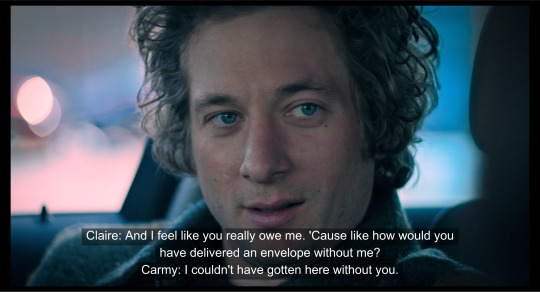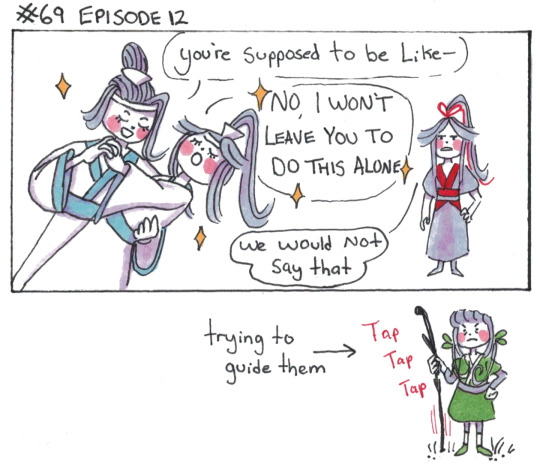#delegalize
Text
Bruce Wayne, sitting in a cute eco-friendly cafe while on a video call with Tim: Oh Noooo, are you sure there’s no way the board of directors will let us get rid of this old decrepit Wayne Factory building that is unsafe for our workers and also for the surrounding environment?
CEO Tim, with equal gravitas: No, I’m afraid they just won’t budge. It technically meets legal requirements on paper, and we can’t prove that the chemicals affecting the local ecosystem that have no other possible source are from the out-of-date drainage system… they’re saying it would cost too much to fix the place up too, which is ridiculous, because we’re us, but our hands are tied…
Bruce, full Brucie himbo mode: Oh I just feel so SAD for all the sweet fluffy animals and the pretty flowers and especially our hard workers dealing with such unsafe conditions… I think I’ll give them all a nice short vacation this weekend, so the ENTIRE PLACE will be EMPTY and SHUT DOWN from FRIDAY TO TUESDAY, the SECURITY SYSTEM WILL BE DOWN because it’s just so GLITCHY, I’m sure nothing will happen to the ENVIRONMENTAL STAIN ON OUR COMPANIES NAME THAT WILL BE COMPLETELY ABANDONED FROM FRIDAY TO TUESDAY- Timmy do you think I’m being too subtle?
Tim, snickering: no no you’re doing great Bruce I’m sure they’ve got it
Poison Ivy, on a date the next table over: ( ‘-‘)-☕️
Harley, through tears of repressed laughter: so… we doing anythin’ this weekend?
#you know they would#at least once#it’s called delegation#dc comcis#brucie wayne#bruce wayne#harley x ivy#poison ivy#harley quinzel#tim drake#batfam#gotta give the girls enrichment#what do you mean dc doesn’t stand for disregard canon
44K notes
·
View notes
Text
< Imagine... >

>> Being a stay at home spouse for your darling husband. Sure it’s not the life you imagined, but you’re happy nonetheless. Besides, it’s quite nice to see him light up whenever you visit their work for lunch.
Still, it’s hard not to worry when your lover comes home, all exhausted and worried. Even if some of it bleeds away from your soothing touches. This just won’t do at all!
So it’s not a big stretch to say that you two arrange a more... different kind of relaxation together.
Nowadays, when your husband comes home, he doesn’t have to think about work at all. It’s become routine now, cooking his favorites. Soft touches exchanged at the table as you fed him bites of each other’s meals.
It’s all so, wonderfully domestic. Until the curtains are drawn, and you both retire to your shared bedroom. Eager for what was next.
Here, your beloved doesn’t have to think! All he needs to worry about is feeling good, and making you feel good. Babbling out the cutest pleas and whines of; “Mnh- please- harder!” and “Closecloseclose- love ple~ase!” As you rutted into him like a wild animal, fat cock carving him open until he fit you perfectly.
Orgasm after orgasm is wrung out of him, until he’s sobbing. And he’ll take more, even as his legs feel like nothing, even when he feels like he’s going to pass out. Because he’s just your darling pet! Your favorite, dumb slut. Made just to be yours, and you for him.
-
<< { ♡ } >> ayato, pantalone, neuvillette, lucifer, diavolo, jing yuan, welt yang, gepard

#genshin impact#genshin x reader#sub genshin#obey me#obmswd#obey me x reader#sub obey me#honkai star rail#hsr#honkai star rail x reader#hsr x reader#sub honkai star rail#sub hsr#dom reader#top reader#male reader#gn reader#< ♥ > writing#i have a personal vendetta against characters being delegated to being bottoms or subs just bc they have traditionally feminine interests#so uh heres this ig#also i never know how to end these things :(#also also an attempt at formatting???? i also. don’t know how to format things
3K notes
·
View notes
Text
Forgot that Zuko’s redemption plot line does involve a small detour into hiring an assassin to kill a 12 year old
9K notes
·
View notes
Text
No one tells you when you get a Big Serious Job™ how many fucking abbreviations you’ll be forced to learn.
#or how many abbreviations that you’ll come across that mean something different from what you’ve always known#I stopped reading a requisition to make this post because I read a sentence that was like#‘something something the COR and the contractor POC’#and I stopped like ‘contractor person of color???’ before remembering Point of Contract#also no one at my job tells you what any of this stuff means. they’re just like Morgan can you take care of this DOA?’#and I gotta sit there like Dead on Arrival??? before figuring out it’s a Delegation of Authority spreadsheet
782 notes
·
View notes
Text

they're actually co-workers they themselves told me
#qsmp#qsmp philza#qsmp badboyhalo#the server's paranoids are actually co-workers#<- this is only cuz they're related to death and i thought it was funny#also the reason phil is bad's superior is cuz phil is directly delegated by the goddess of death#while grim reapers work under the goddess of death will#or something im just making shit up LOL#my art
2K notes
·
View notes
Text
requests from twt :DDD (content in tags, in order !!)





#1#bingqijiu#2 n 3#liujiu#4#yueliujiu#5#SHEN JIU WITH A CAT#i should probs find a better way to tag this#will delegate that to a future version of me#svsss#mxtx
2K notes
·
View notes
Text

House Minority Leader Hakeem Jeffries spoke at Al Sharpton’s National Action Network 2024 Convention, activists and organizers from Black Alliance for Peace and PSL disrupted the event.
They denounced Jeffries and Sharpton as Black Misleaders, boldly proclaiming that the duo doesn’t represent the majority of Black/African people and instead provides a Blackface cover to U.S. imperialism.
Jeffries received over $700,000 in Israel lobby funding in the last election cycle alone. Last year, Jeffries led a bipartisan Congressional delegation to the CARICOM Heads of Government Conference where NO HAITIANS were in the room as the the invasion and occupation of the country was planned.
The collective liberation of Africa and Africans is not guaranteed without the liberation of Palestine, Haiti, or even the Borough of Brooklyn that Jeffries was elected to represent instead of approving more money to IOF-trained NYPD!
#hakeem jeffries#al sharpton#national action network#black alliance for peace#psl#black misleaders#blackface cover#us imperialism#israel lobby funding#bipartisan congressional delegation#caricom conference#haiti invasion#africa liberation#palestine liberation#brooklyn representation#iof-trained nypd#activist disruption#collective liberation
379 notes
·
View notes
Text
If any of you fellow europeans have any backbone, you'll not watch Eurovision this weekend. If you have tickets, don't go to the show. I'm hoping the other countries refuse to perform, so they won't have a show to broadcast. Let eden and her sad little delegation perform her sad little act in front of an empty stadium.
#for context: israel has been provoking basically every other performer and their delegation#and joost (NL) had enough and allegedly got physical#he was prompty disqualified which is eurovision history no one has been disqualified before#apparently someone from the israel team made fun of joost's dead parents#that or made fun of dead people as a whole#idk exactly what's going on all i know is i stand with joost#fuck israel fuck the ebu fuck eurovision#eurovision#eurovision 2024#boycott israel#boycott eurovision
360 notes
·
View notes
Text
The disenshittified internet starts with loyal "user agents"

I'm in TARTU, ESTONIA! Overcoming the Enshittocene (TOMORROW, May 8, 6PM, Prima Vista Literary Festival keynote, University of Tartu Library, Struwe 1). AI, copyright and creative workers' labor rights (May 10, 8AM: Science Fiction Research Association talk, Institute of Foreign Languages and Cultures building, Lossi 3, lobby). A talk for hackers on seizing the means of computation (May 10, 3PM, University of Tartu Delta Centre, Narva 18, room 1037).

There's one overwhelmingly common mistake that people make about enshittification: assuming that the contagion is the result of the Great Forces of History, or that it is the inevitable end-point of any kind of for-profit online world.
In other words, they class enshittification as an ideological phenomenon, rather than as a material phenomenon. Corporate leaders have always felt the impulse to enshittify their offerings, shifting value from end users, business customers and their own workers to their shareholders. The decades of largely enshittification-free online services were not the product of corporate leaders with better ideas or purer hearts. Those years were the result of constraints on the mediocre sociopaths who would trade our wellbeing and happiness for their own, constraints that forced them to act better than they do today, even if the were not any better:
https://pluralistic.net/2024/04/24/naming-names/#prabhakar-raghavan
Corporate leaders' moments of good leadership didn't come from morals, they came from fear. Fear that a competitor would take away a disgruntled customer or worker. Fear that a regulator would punish the company so severely that all gains from cheating would be wiped out. Fear that a rival technology – alternative clients, tracker blockers, third-party mods and plugins – would emerge that permanently severed the company's relationship with their customers. Fears that key workers in their impossible-to-replace workforce would leave for a job somewhere else rather than participate in the enshittification of the services they worked so hard to build:
https://pluralistic.net/2024/04/22/kargo-kult-kaptialism/#dont-buy-it
When those constraints melted away – thanks to decades of official tolerance for monopolies, which led to regulatory capture and victory over the tech workforce – the same mediocre sociopaths found themselves able to pursue their most enshittificatory impulses without fear.
The effects of this are all around us. In This Is Your Phone On Feminism, the great Maria Farrell describes how audiences at her lectures profess both love for their smartphones and mistrust for them. Farrell says, "We love our phones, but we do not trust them. And love without trust is the definition of an abusive relationship":
https://conversationalist.org/2019/09/13/feminism-explains-our-toxic-relationships-with-our-smartphones/
I (re)discovered this Farrell quote in a paper by Robin Berjon, who recently co-authored a magnificent paper with Farrell entitled "We Need to Rewild the Internet":
https://www.noemamag.com/we-need-to-rewild-the-internet/
The new Berjon paper is narrower in scope, but still packed with material examples of the way the internet goes wrong and how it can be put right. It's called "The Fiduciary Duties of User Agents":
https://papers.ssrn.com/sol3/papers.cfm?abstract_id=3827421
In "Fiduciary Duties," Berjon focuses on the technical term "user agent," which is how web browsers are described in formal standards documents. This notion of a "user agent" is a holdover from a more civilized age, when technologists tried to figure out how to build a new digital space where technology served users.
A web browser that's a "user agent" is a comforting thought. An agent's job is to serve you and your interests. When you tell it to fetch a web-page, your agent should figure out how to get that page, make sense of the code that's embedded in, and render the page in a way that represents its best guess of how you'd like the page seen.
For example, the user agent might judge that you'd like it to block ads. More than half of all web users have installed ad-blockers, constituting the largest consumer boycott in human history:
https://doc.searls.com/2023/11/11/how-is-the-worlds-biggest-boycott-doing/
Your user agent might judge that the colors on the page are outside your visual range. Maybe you're colorblind, in which case, the user agent could shift the gamut of the colors away from the colors chosen by the page's creator and into a set that suits you better:
https://dankaminsky.com/dankam/
Or maybe you (like me) have a low-vision disability that makes low-contrast type difficult to impossible to read, and maybe the page's creator is a thoughtless dolt who's chosen light grey-on-white type, or maybe they've fallen prey to the absurd urban legend that not-quite-black type is somehow more legible than actual black type:
https://uxplanet.org/basicdesign-never-use-pure-black-in-typography-36138a3327a6
The user agent is loyal to you. Even when you want something the page's creator didn't consider – even when you want something the page's creator violently objects to – your user agent acts on your behalf and delivers your desires, as best as it can.
Now – as Berjon points out – you might not know exactly what you want. Like, you know that you want the privacy guarantees of TLS (the difference between "http" and "https") but not really understand the internal cryptographic mysteries involved. Your user agent might detect evidence of shenanigans indicating that your session isn't secure, and choose not to show you the web-page you requested.
This is only superficially paradoxical. Yes, you asked your browser for a web-page. Yes, the browser defied your request and declined to show you that page. But you also asked your browser to protect you from security defects, and your browser made a judgment call and decided that security trumped delivery of the page. No paradox needed.
But of course, the person who designed your user agent/browser can't anticipate all the ways this contradiction might arise. Like, maybe you're trying to access your own website, and you know that the security problem the browser has detected is the result of your own forgetful failure to renew your site's cryptographic certificate. At that point, you can tell your browser, "Thanks for having my back, pal, but actually this time it's fine. Stand down and show me that webpage."
That's your user agent serving you, too.
User agents can be well-designed or they can be poorly made. The fact that a user agent is designed to act in accord with your desires doesn't mean that it always will. A software agent, like a human agent, is not infallible.
However – and this is the key – if a user agent thwarts your desire due to a fault, that is fundamentally different from a user agent that thwarts your desires because it is designed to serve the interests of someone else, even when that is detrimental to your own interests.
A "faithless" user agent is utterly different from a "clumsy" user agent, and faithless user agents have become the norm. Indeed, as crude early internet clients progressed in sophistication, they grew increasingly treacherous. Most non-browser tools are designed for treachery.
A smart speaker or voice assistant routes all your requests through its manufacturer's servers and uses this to build a nonconsensual surveillance dossier on you. Smart speakers and voice assistants even secretly record your speech and route it to the manufacturer's subcontractors, whether or not you're explicitly interacting with them:
https://www.sciencealert.com/creepy-new-amazon-patent-would-mean-alexa-records-everything-you-say-from-now-on
By design, apps and in-app browsers seek to thwart your preferences regarding surveillance and tracking. An app will even try to figure out if you're using a VPN to obscure your location from its maker, and snitch you out with its guess about your true location.
Mobile phones assign persistent tracking IDs to their owners and transmit them without permission (to its credit, Apple recently switch to an opt-in system for transmitting these IDs) (but to its detriment, Apple offers no opt-out from its own tracking, and actively lies about the very existence of this tracking):
https://pluralistic.net/2022/11/14/luxury-surveillance/#liar-liar
An Android device running Chrome and sitting inert, with no user interaction, transmits location data to Google every five minutes. This is the "resting heartbeat" of surveillance for an Android device. Ask that device to do any work for you and its pulse quickens, until it is emitting a nearly continuous stream of information about your activities to Google:
https://digitalcontentnext.org/blog/2018/08/21/google-data-collection-research/
These faithless user agents both reflect and enable enshittification. The locked-down nature of the hardware and operating systems for Android and Ios devices means that manufacturers – and their business partners – have an arsenal of legal weapons they can use to block anyone who gives you a tool to modify the device's behavior. These weapons are generically referred to as "IP rights" which are, broadly speaking, the right to control the conduct of a company's critics, customers and competitors:
https://locusmag.com/2020/09/cory-doctorow-ip/
A canny tech company can design their products so that any modification that puts the user's interests above its shareholders is illegal, a violation of its copyright, patent, trademark, trade secrets, contracts, terms of service, nondisclosure, noncompete, most favored nation, or anticircumvention rights. Wrap your product in the right mix of IP, and its faithless betrayals acquire the force of law.
This is – in Jay Freeman's memorable phrase – "felony contempt of business model." While more than half of all web users have installed an ad-blocker, thus overriding the manufacturer's defaults to make their browser a more loyal agent, no app users have modified their apps with ad-blockers.
The first step of making such a blocker, reverse-engineering the app, creates criminal liability under Section 1201 of the Digital Millennium Copyright Act, with a maximum penalty of five years in prison and a $500,000 fine. An app is just a web-page skinned in sufficient IP to make it a felony to add an ad-blocker to it (no wonder every company wants to coerce you into using its app, rather than its website).
If you know that increasing the invasiveness of the ads on your web-page could trigger mass installations of ad-blockers by your users, it becomes irrational and self-defeating to ramp up your ads' invasiveness. The possibility of interoperability acts as a constraint on tech bosses' impulse to enshittify their products.
The shift to platforms dominated by treacherous user agents – apps, mobile ecosystems, walled gardens – weakens or removes that constraint. As your ability to discipline your agent so that it serves you wanes, the temptation to turn your user agent against you grows, and enshittification follows.
This has been tacitly understood by technologists since the web's earliest days and has been reaffirmed even as enshittification increased. Berjon quotes extensively from "The Internet Is For End-Users," AKA Internet Architecture Board RFC 8890:
Defining the user agent role in standards also creates a virtuous cycle; it allows multiple implementations, allowing end users to switch between them with relatively low costs (…). This creates an incentive for implementers to consider the users' needs carefully, which are often reflected into the defining standards. The resulting ecosystem has many remaining problems, but a distinguished user agent role provides an opportunity to improve it.
And the W3C's Technical Architecture Group echoes these sentiments in "Web Platform Design Principles," which articulates a "Priority of Constituencies" that is supposed to be central to the W3C's mission:
User needs come before the needs of web page authors, which come before the needs of user agent implementors, which come before the needs of specification writers, which come before theoretical purity.
https://w3ctag.github.io/design-principles/
But the W3C's commitment to faithful agents is contingent on its own members' commitment to these principles. In 2017, the W3C finalized "EME," a standard for blocking mods that interact with streaming videos. Nominally aimed at preventing copyright infringement, EME also prevents users from choosing to add accessibility add-ons that beyond the ones the streaming service permits. These services may support closed captioning and additional narration of visual elements, but they block tools that adapt video for color-blind users or prevent strobe effects that trigger seizures in users with photosensitive epilepsy.
The fight over EME was the most contentious struggle in the W3C's history, in which the organization's leadership had to decide whether to honor the "priority of constituencies" and make a standard that allowed users to override manufacturers, or whether to facilitate the creation of faithless agents specifically designed to thwart users' desires on behalf of manufacturers:
https://www.eff.org/deeplinks/2017/09/open-letter-w3c-director-ceo-team-and-membership
This fight was settled in favor of a handful of extremely large and powerful companies, over the objections of a broad collection of smaller firms, nonprofits representing users, academics and other parties agitating for a web built on faithful agents. This coincided with the W3C's operating budget becoming entirely dependent on the very large sums its largest corporate members paid.
W3C membership is on a sliding scale, based on a member's size. Nominally, the W3C is a one-member, one-vote organization, but when a highly concentrated collection of very high-value members flex their muscles, W3C leadership seemingly perceived an existential risk to the organization, and opted to sacrifice the faithfulness of user agents in service to the anti-user priorities of its largest members.
For W3C's largest corporate members, the fight was absolutely worth it. The W3C's EME standard transformed the web, making it impossible to ship a fully featured web-browser without securing permission – and a paid license – from one of the cartel of companies that dominate the internet. In effect, Big Tech used the W3C to secure the right to decide who would compete with them in future, and how:
https://blog.samuelmaddock.com/posts/the-end-of-indie-web-browsers/
Enshittification arises when the everyday mediocre sociopaths who run tech companies are freed from the constraints that act against them. When the web – and its browsers – were a big, contented, diverse, competitive space, it was harder for tech companies to collude to capture standards bodies like the W3C to secure even more dominance. As the web turned into Tom Eastman's "five giant websites filled with screenshots of text from the other four," that kind of collusion became much easier:
https://pluralistic.net/2023/04/18/cursed-are-the-sausagemakers/#how-the-parties-get-to-yes
In arguing for faithful agents, Berjon associates himself with the group of scholars, regulators and activists who call for user agents to serve as "information fiduciaries." Mostly, information fiduciaries come up in the context of user privacy, with the idea that entities that hold a user's data would have the obligation to put the user's interests ahead of their own. Think of a lawyer's fiduciary duty in respect of their clients, to give advice that reflects the client's best interests, even when that conflicts with the lawyer's own self-interest. For example, a lawyer who believes that settling a case is the best course of action for a client is required to tell them so, even if keeping the case going would generate more billings for the lawyer and their firm.
For a user agent to be faithful, it must be your fiduciary. It must put your interests ahead of the interests of the entity that made it or operates it. Browsers, email clients, and other internet software that served as a fiduciary would do things like automatically blocking tracking (which most email clients don't do, especially webmail clients made by companies like Google, who also sell advertising and tracking).
Berjon contemplates a legally mandated fiduciary duty, citing Lindsey Barrett's "Confiding in Con Men":
https://papers.ssrn.com/sol3/papers.cfm?abstract_id=3354129
He describes a fiduciary duty as a remedy for the enforcement failures of EU's GDPR, a solidly written, and dismally enforced, privacy law. A legally backstopped duty for agents to be fiduciaries would also help us distinguish good and bad forms of "innovation" – innovation in ways of thwarting a user's will are always bad.
Now, the tech giants insist that they are already fiduciaries, and that when they thwart a user's request, that's more like blocking access to a page where the encryption has been compromised than like HAL9000's "I can't let you do that, Dave." For example, when Louis Barclay created "Unfollow Everything," he (and his enthusiastic users) found that automating the process of unfollowing every account on Facebook made their use of the service significantly better:
https://slate.com/technology/2021/10/facebook-unfollow-everything-cease-desist.html
When Facebook shut the service down with blood-curdling legal threats, they insisted that they were simply protecting users from themselves. Sure, this browser automation tool – which just automatically clicked links on Facebook's own settings pages – seemed to do what the users wanted. But what if the user interface changed? What if so many users added this feature to Facebook without Facebook's permission that they overwhelmed Facebook's (presumably tiny and fragile) servers and crashed the system?
These arguments have lately resurfaced with Ethan Zuckerman and Knight First Amendment Institute's lawsuit to clarify that "Unfollow Everything 2.0" is legal and doesn't violate any of those "felony contempt of business model" laws:
https://pluralistic.net/2024/05/02/kaiju-v-kaiju/
Sure, Zuckerman seems like a good guy, but what if he makes a mistake and his automation tool does something you don't want? You, the Facebook user, are also a nice guy, but let's face it, you're also a naive dolt and you can't be trusted to make decisions for yourself. Those decisions can only be made by Facebook, whom we can rely upon to exercise its authority wisely.
Other versions of this argument surfaced in the debate over the EU's decision to mandate interoperability for end-to-end encrypted (E2EE) messaging through the Digital Markets Act (DMA), which would let you switch from, say, Whatsapp to Signal and still send messages to your Whatsapp contacts.
There are some good arguments that this could go horribly awry. If it is rushed, or internally sabotaged by the EU's state security services who loathe the privacy that comes from encrypted messaging, it could expose billions of people to serious risks.
But that's not the only argument that DMA opponents made: they also argued that even if interoperable messaging worked perfectly and had no security breaches, it would still be bad for users, because this would make it impossible for tech giants like Meta, Google and Apple to spy on message traffic (if not its content) and identify likely coordinated harassment campaigns. This is literally the identical argument the NSA made in support of its "metadata" mass-surveillance program: "Reading your messages might violate your privacy, but watching your messages doesn't."
This is obvious nonsense, so its proponents need an equally obviously intellectually dishonest way to defend it. When called on the absurdity of "protecting" users by spying on them against their will, they simply shake their heads and say, "You just can't understand the burdens of running a service with hundreds of millions or billions of users, and if I even tried to explain these issues to you, I would divulge secrets that I'm legally and ethically bound to keep. And even if I could tell you, you wouldn't understand, because anyone who doesn't work for a Big Tech company is a naive dolt who can't be trusted to understand how the world works (much like our users)."
Not coincidentally, this is also literally the same argument the NSA makes in support of mass surveillance, and there's a very useful name for it: scalesplaining.
Now, it's totally true that every one of us is capable of lapses in judgment that put us, and the people connected to us, at risk (my own parents gave their genome to the pseudoscience genetic surveillance company 23andme, which means they have my genome, too). A true information fiduciary shouldn't automatically deliver everything the user asks for. When the agent perceives that the user is about to put themselves in harm's way, it should throw up a roadblock and explain the risks to the user.
But the system should also let the user override it.
This is a contentious statement in information security circles. Users can be "socially engineered" (tricked), and even the most sophisticated users are vulnerable to this:
https://pluralistic.net/2024/02/05/cyber-dunning-kruger/#swiss-cheese-security
The only way to be certain a user won't be tricked into taking a course of action is to forbid that course of action under any circumstances. If there is any means by which a user can flip the "are you very sure?" circuit-breaker back on, then the user can be tricked into using that means.
This is absolutely true. As you read these words, all over the world, vulnerable people are being tricked into speaking the very specific set of directives that cause a suspicious bank-teller to authorize a transfer or cash withdrawal that will result in their life's savings being stolen by a scammer:
https://www.thecut.com/article/amazon-scam-call-ftc-arrest-warrants.html
We keep making it harder for bank customers to make large transfers, but so long as it is possible to make such a transfer, the scammers have the means, motive and opportunity to discover how the process works, and they will go on to trick their victims into invoking that process.
Beyond a certain point, making it harder for bank depositors to harm themselves creates a world in which people who aren't being scammed find it nearly impossible to draw out a lot of cash for an emergency and where scam artists know exactly how to manage the trick. After all, non-scammers only rarely experience emergencies and thus have no opportunity to become practiced in navigating all the anti-fraud checks, while the fraudster gets to run through them several times per day, until they know them even better than the bank staff do.
This is broadly true of any system intended to control users at scale – beyond a certain point, additional security measures are trivially surmounted hurdles for dedicated bad actors and as nearly insurmountable hurdles for their victims:
https://pluralistic.net/2022/08/07/como-is-infosec/
At this point, we've had a couple of decades' worth of experience with technological "walled gardens" in which corporate executives get to override their users' decisions about how the system should work, even when that means reaching into the users' own computer and compelling it to thwart the user's desire. The record is inarguable: while companies often use those walls to lock bad guys out of the system, they also use the walls to lock their users in, so that they'll be easy pickings for the tech company that owns the system:
https://pluralistic.net/2023/02/05/battery-vampire/#drained
This is neatly predicted by enshittification's theory of constraints: when a company can override your choices, it will be irresistibly tempted to do so for its own benefit, and to your detriment.
What's more, the mere possibility that you can override the way the system works acts as a disciplining force on corporate executives, forcing them to reckon with your priorities even when these are counter to their shareholders' interests. If Facebook is genuinely worried that an "Unfollow Everything" script will break its servers, it can solve that by giving users an unfollow everything button of its own design. But so long as Facebook can sue anyone who makes an "Unfollow Everything" tool, they have no reason to give their users such a button, because it would give them more control over their Facebook experience, including the controls needed to use Facebook less.
It's been more than 20 years since Seth Schoen and I got a demo of Microsoft's first "trusted computing" system, with its "remote attestations," which would let remote servers demand and receive accurate information about what kind of computer you were using and what software was running on it.
This could be beneficial to the user – you could send a "remote attestation" to a third party you trusted and ask, "Hey, do you think my computer is infected with malicious software?" Since the trusted computing system produced its report on your computer using a sealed, separate processor that the user couldn't directly interact with, any malicious code you were infected with would not be able to forge this attestation.
But this remote attestation feature could also be used to allow Microsoft to block you from opening a Word document with Libreoffice, Apple Pages, or Google Docs, or it could be used to allow a website to refuse to send you pages if you were running an ad-blocker. In other words, it could transform your information fiduciary into a faithless agent.
Seth proposed an answer to this: "owner override," a hardware switch that would allow you to force your computer to lie on your behalf, when that was beneficial to you, for example, by insisting that you were using Microsoft Word to open a document when you were really using Apple Pages:
https://web.archive.org/web/20021004125515/http://vitanuova.loyalty.org/2002-07-05.html
Seth wasn't naive. He knew that such a system could be exploited by scammers and used to harm users. But Seth calculated – correctly! – that the risks of having a key to let yourself out of the walled garden were less than being stuck in a walled garden where some corporate executive got to decide whether and when you could leave.
Tech executives never stopped questing after a way to turn your user agent from a fiduciary into a traitor. Last year, Google toyed with the idea of adding remote attestation to web browsers, which would let services refuse to interact with you if they thought you were using an ad blocker:
https://pluralistic.net/2023/08/02/self-incrimination/#wei-bai-bai
The reasoning for this was incredible: by adding remote attestation to browsers, they'd be creating "feature parity" with apps – that is, they'd be making it as practical for your browser to betray you as it is for your apps to do so (note that this is the same justification that the W3C gave for creating EME, the treacherous user agent in your browser – "streaming services won't allow you to access movies with your browser unless your browser is as enshittifiable and authoritarian as an app").
Technologists who work for giant tech companies can come up with endless scalesplaining explanations for why their bosses, and not you, should decide how your computer works. They're wrong. Your computer should do what you tell it to do:
https://www.eff.org/deeplinks/2023/08/your-computer-should-say-what-you-tell-it-say-1
These people can kid themselves that they're only taking away your power and handing it to their boss because they have your best interests at heart. As Upton Sinclair told us, it's impossible to get someone to understand something when their paycheck depends on them not understanding it.
The only way to get a tech boss to consistently treat you well is to ensure that if they stop, you can quit. Anything less is a one-way ticket to enshittification.

If you'd like an essay-formatted version of this post to read or share, here's a link to it on pluralistic.net, my surveillance-free, ad-free, tracker-free blog:
https://pluralistic.net/2024/05/07/treacherous-computing/#rewilding-the-internet

Image:
Cryteria (modified) https://commons.wikimedia.org/wiki/File:HAL9000.svg
CC BY 3.0
https://creativecommons.org/licenses/by/3.0/deed.en
#pluralistic#maria farrell#scalesplaining#user agents#eme#w3c#sdos#scholarship#information fiduciary#the internet is for end users#ietf#delegation#bootlickers#unfollow everything#remote attestation#browsers#treacherous computing#enshittification#snitch chips#Robin Berjon#rewilding the internet
345 notes
·
View notes
Text




#I am NOT going to sit here and stare at this post and fiddle with it and have a complex about it#I am just going to post it because I think it is Interesting#Carmy bantering with Claire over an extremely basic task that he obviously could have done alone or delegated#versus Carmy dead fucking serious with Sydney saying I would not be doing any of this without you.#just something to think about!#the bear#sydcarmy#chris storer I am in your walls I just wanna talk
793 notes
·
View notes
Text




his summer outfit makes me craaaaaazyyyyyyy...............
#SAURR CUTEEE srsly devastating the summer outfits were delegated to a single movie.#naruto#hatake kakashi#lorillee.txt
308 notes
·
View notes
Note
Update on May 1st protests and how the french goverment handled them?

^ The May 1st protests were pretty violent esp. in Paris; two cops were set on fire (they're ok, one has 2nd degree burns), lots of destruction in city streets, and hundreds of injured protesters. The French gov is sticking to its M.O. of denying any police violence against protesters, emphasising protesters' violence and portraying it as mindless anti-democratic savagery rather than the result of their own anti-democratic policies.
There were more people protesting in the streets on Monday than at any other May Day protest in the past 20 years (by a large margin—7 to 10x more people than usual.) And the numbers are still impressive in terms of this current social movement—there were about 1.2 million people at the first protest against the pension reform in January, 900K at one of the February protests, around 1.1M on March 7 and I think 1.2M on March 23rd... We're in May and there were 800K people in the streets on Monday (using the police's probably low estimate). The first marches earlier this year were peaceful; people started destroying shit in March after the 49.3 (=the gov not letting elected representatives vote on the reform); in the following weeks we saw a brutal escalation of police violence + suppression of just about any means of non-violent protest, which results in more violence.
The vast majority of protesters are still peaceful, but in terms of providing context for the increased violence, well—people protested peacefully, peaceful protests got banned. People banged pots and pans, pots and pans got banned and confiscated. People started a petition on the National Assembly website which got a record number of signatures, the petition was closed before its deadline and ignored. MPs asked (twice!) for a national referendum on the reform to be held, their requests were denied. Electricity unionists cut power in buildings Macron was visiting, now he travels around with a portable generator. Unions tried to distribute whistles and red cards (penalty cards) to football supporters before the French Cup finale last week, so the ones who wanted could use them if Macron showed up (he ended up hiding and greeting the footballers indoors rather than publicly on the stadium lawn); the police prefecture tried banning union members from gathering outside the stadium to distribute these items (although the ban was struck down by the judiciary as it was illegal, like most bans these days...)
Confiscating saucepans was already so absurd it felt like a gratuitous fuck you, but now they're trying to prevent the distribution of pieces of red paper. Cancelling petitions that would have had no real impact anyway. Prosecuting people for insulting Macron. Arbitrarily arresting hundreds of nonviolent protesters to intimidate them out of protesting (guess who's left then?). The French gov is systematically repressing democratic or nonviolent means of making your opinion heard, and when people get more violent they're like "This is unacceptable, don't these terrorists know there are other means of expressing dissent??" Where? This week a 77-year-old man was summoned to the police station and will be forced to take a "citizenship course" for having a banner outside his house that read "Macron fuck you" (Macron on t'emmerde). Note that he would have been arrested (like the woman who was arrested at her home and spent a night in police custody for calling Macron "garbage" on Facebook) but they decided not to only because of his age.
So that's where we're at; on Monday two cops caught on fire (well, their fireproof suit did) after protesters threw a Molotov cocktail at them. (The street medic who tried to help them with their burns ended up getting shot by a cop's riot gun a few seconds later—with French police no good deed goes unpunished!) The media talked a lot more about this incident than about the fact that the cop who got most severely injured on that day (broken vertebrae) was injured by an explosive grenade that a colleague of his meant to throw at protesters (you can see it at the end of the video below). If police with all their protective gear get so badly injured by their own weapons, no wonder the worst injuries have been on the protesters' side. (nearly 600 injured protesters on May 1st, 120 severely, according to street medics.) I'm not including images of these incidents in the video but on May 1st a protester had his hand mutilated by a police grenade + a 17 year old girl was hit in the eye by a grenade fragment, may end up losing it (during the Yellow Vests protests, Macron's first attempt at repressing a social movement, 38 protesters lost an eye or a hand).
What you see in the video: cops charging the front of a march to tear a banner off people's hands then retreating and drowning the street in tear gas when protesters throw paint bombs at them (protesters have umbrellas because of police drones); at 0:30, a journalist saying "They're not even arresting him, just kicking him when he's down—they kicked him right in the face!" then police spraying with tear gas protesters who try to fend them off; at 0:46 when a protester being arrested asks a journalist if he's filming and starts reading out loud a cop's ID number, another cop shoves the journalist and throws him to the ground; at 0:54, an Irish journalist runs away from the police tear gas grenades that you hear going off, at 01:08, the incident mentioned above when a cop drops a grenade he tried to throw, which explodes in his group, breaking another cop's vertebrae.
There's a lot more I'm not including, like how CNN said "there's so much tear gas in Paris, our foreign correspondent can barely breathe", how another journalist was hit by a sting-ball grenade (he was also bludgeoned on the head so hard it broke his helmet—even though cops know the people wearing helmets are journalists...), and yet another journalist who was calling out a cop for aiming at people's heads with his riot gun (which is illegal) ended up having the guy aim the riot gun at his head from 2 metres away (getting shot with this "less lethal weapon" from that distance would be lethal.)
All of these videos are from May 1st (most of them from this account monitoring police violence.)
So yeah, nonviolent protests followed by violent police repression and bans of nonviolent means of protesting result in more violent protests. The French government responds by a) pikachu surpris, b) condemning violent protesters and praising violent police to the skies, c) continuing to ban everything they can think of. Confiscating saucepans didn't work but confiscating pieces of red paper will do the trick! Let's prosecute people for bashing or burning an effigy of Macron, because banning symbolic violence always works to prevent actual violence! And this week after the May 1st protests we learnt that the gov is thinking of making street barricades illegal, because that'll definitely solve everything. It's going to be interesting for history teachers to teach students about the 1789 revolution that allowed us to take down an absolutist regime and become a republic, under a government that banned barricades because they see them as terrorist anti-republican structures.

^ Statue symbolising the French Republic (on Place de la République in Paris) dressed with a 'Macron resign' shirt by protesters on May 1st.
#ask#frpol#left-wing MPs this week asked to hold a debate in the Assembly about the repression of this social movement#the Minister of the Interior (in charge of police) didn't come but sent his delegate instead#the delegate refused to admit to any problem with law enforcement and at some point walked out as a MP was asking a question#this happened 1 day after the UN Human Rights Council condemned the French gov's violent & racist law enforcement#god there's so much infuriating shit happening every single day
2K notes
·
View notes
Text

Instruction on Courtship
[First] Prev <--> Next
#poorly drawn mdzs#mdzs#lan jingyi#lan sizhui#wei wuxian#a-qing#(In case ppl are wondering: LJY and LSZ changed their hairstyles to get into character).#I love this scene very much its so silly and sweet#a-qing is WAITING though guys. Come ON#Lan Jingyi definitely is the type to read romance novels and be a deep romantic at heart. And of course vehemently deny it.#But the truth of the matter is that wwx and lwj don't follow those typical romance tropes (at least not at the moment)#wwx and lwj split up because they *know* the other one is perfectly capable on their own! It's about acknowledgement and respect.#The original line was “Why. I trust him and his skills” which is more accurate to the Audio Drama. Because that's the core of what makes#Wangxian so good! Trust!! Despite years of miscommunication- there is deep trust between these two!#They can and will delegate tasks because they are an effective team!#If you cannot trust the person you say you love and care about - you have killed that relationship. (Genuine relationship advice).#Add one more to the 'retelling of wwx's story from other's perspective' counter.#I know that wangxian get more lovey later on but I really feel like mxtx was trying to make a point here. The more interesting dynamics#are not one's that rehash lines and tropes from dime a dozen romance books (sorry boys)
905 notes
·
View notes
Text
I need Käärijä to stop catching strays in all this.
dude had his win absolutely robbed last year, stood up for Baby Lasagna only to get bodyshamed by the guy later, was put in an interval act that was basically all about Sweden gloating about how he got screwed over, and then people acting like him being amicable and friendly to the wrong person is equal to him dropping a nuke on Palestine all by himself.
give Jere from Vantaa a break he's literally just a dude.
#look. I get it. I get it. he shouldn't have been hanging with Eden.#but people act as if they approached him and went ''do you wanna film a clip to promote genocide?'' and he went ''fuck yeah''#and not yknow. a man known to be sweet and friendly to everyone being approached by another human and acting like he always does.#yes there are obvious problems with Jere trying to stay non-political in this situation but that is what he was trying to do.#he wasn't enforcing anyone or anything. he was being himself - friendly and sweet to everyone - and secretly filmed and used as ammo.#some of yall acting like he's besties with the Israel delegation as if he didn't get shamelessly used by them.#käärijä#esc 2024#eurovision 2024
188 notes
·
View notes
Text
well, Joost didn't lie, a disqualification right before the grand final is certainly not something we've seen on the Eurovision stage
#eurovision#esc#i dunno how i feel about it#i don't like the guy but we don't know what the hell that “altercation” even was#i hoped that it'll work out in the end but alas#also incredible that israeli delegation has apparently nothing to do with this#the elephant in the room wasn't involved somehow
155 notes
·
View notes
Text
embracing my morning gym girlie routine i think. gonna study for like 3 more hours then hit the gym in the cutest workout fit. and then im rewarding myself w my favorite veggie wrap after <3
#studying first thing at dawn just sets the day right for me and i love doing it#but i usually delegate the gym to evening hours. and yesterday i was sour as fuck after bc i just did it on empty#plus i try to get around 7-8 hours of studying in and working out earlier in the day would help me feel sm better#i need the endorphins.#and i could get some flash cards out of the way while i’m there#AND have extra time to hit my orgo lab in the evening and get in a couple hours of research#my social life has been on a major back burner but i can barely get a second to myself these days#so i’m trying not to feel guilty ab my 82727 unanswered msgs. we ball
170 notes
·
View notes